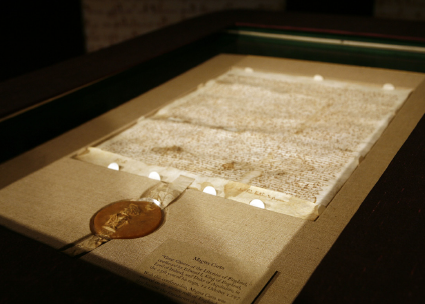MAGNA CARTA
800 years ago the king of England was challenged about how he treated his people. Churchmen, barons and knights challenged the king’s rule and took control (by force) of the rich city of London. The king needed control over the city because it was so wealthy and was an enormous source of income for him, and so he took people’s goods. And that is when the Magna Carta was born. It is a document or “charter” which lays out the rights of the people and states that the law applies to everyone even the king.
The Magna Carta is celebrated for creating the idea of human rights, the idea that “all men are equal” and was the start of people’s human rights being protected in the UK and elsewhere. A section of the document reads: “No free man shall be imprisoned or stripped of his rights or possessions… except by the lawful judgement of his equals or by the law of the land”. Which means nobody will be put in prison or punished unless they are found guilty by trial and those in power (kings, queens, prime ministers) cannot just send someone to prison, or take their things because they feel like it - the person has to have been found guilty of breaking a law.
This is the foundation of modern civilization as we know it. Essentially, the Magna Carta protected normal, everyday people from being completely controlled by their rulers, giving them the freedom to live their lives the way they choose, own things without fearing they will be taken away, and have freedom and independence. It also allowed the general population to hold their rulers to account. Before the Magna Carta, the king could take whatever he felt like from anyone, but after signing the charter, if the king tried to take something that didn’t belong to him, he could be arrested and put in prison the same as the rest of the people in his kingdom.

